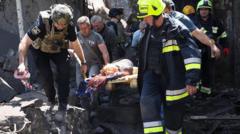In the wake of a recent ceasefire announcement, Iranians are cautiously navigating a complex emotional landscape marked by fear, hope, and a painful weariness from the prolonged conflict. Sirous, an Iranian resident who preferred anonymity for safety, reflects the sentiments of many, asserting that the true victims of the war are the ordinary citizens who bear the brunt of the unrest. The ceasefire, which comes after a harrowing twelve days of military strikes and escalating tensions, has left the populace in a state of apprehension and uncertainty regarding their future.
### "Iranians Grapple with Fragile Ceasefire: A Nation Exhausted by Conflict"

### "Iranians Grapple with Fragile Ceasefire: A Nation Exhausted by Conflict"
Amidst the fragile ceasefire between Iran and Israel, everyday Iranians share their feelings of despair, fear, and a deep exhaustion from ongoing turmoil.
Iran's health minister reported over 600 fatalities, although independent estimates suggest the toll may be much higher. The consequences of the violence intertwine with economic hardships exacerbated by sanctions, leaving many like Minoo—another anonymized speaker—feeling trapped between the devastation of war and the oppressive weight of their government's actions. She expresses a collective exhaustion, stating, “We just want to live in peace in the country we love.”
Despite the ceasefire's announcement by former President Donald Trump, skepticism abounds as both factions accuse one another of violations. Raid sirens and military activities continue to signal ongoing strife, inciting fears that the ceasefire might only be a temporary reprieve. For many, the distrust in the government’s motives is palpable, with concerns about potential increases in repression rather than genuine peace.
Mehdi, another local citizen interviewed, articulates a fear that the government will emphasize military strength over societal needs. He cautions against the regime's tactics to suppress dissent while offering illusions of freedom, voicing broader concerns that any semblance of post-conflict recovery will not benefit the people but rather the state.
Others share a similar belief that the ceasefire is tenuous at best. Arman, questioning its effectiveness, declares that the conflict is unlikely to resolve without substantial changes to the current regime. The pervasive uncertainty continues to loom over the Iranian populace as they remain watchful of any signs of prolonged violence or further governmental oppression.
As global attention converges on this delicate situation, the questions of peace and stability hang heavily in the air, with many seeking a true resolution rather than another fragile truce.
Despite the ceasefire's announcement by former President Donald Trump, skepticism abounds as both factions accuse one another of violations. Raid sirens and military activities continue to signal ongoing strife, inciting fears that the ceasefire might only be a temporary reprieve. For many, the distrust in the government’s motives is palpable, with concerns about potential increases in repression rather than genuine peace.
Mehdi, another local citizen interviewed, articulates a fear that the government will emphasize military strength over societal needs. He cautions against the regime's tactics to suppress dissent while offering illusions of freedom, voicing broader concerns that any semblance of post-conflict recovery will not benefit the people but rather the state.
Others share a similar belief that the ceasefire is tenuous at best. Arman, questioning its effectiveness, declares that the conflict is unlikely to resolve without substantial changes to the current regime. The pervasive uncertainty continues to loom over the Iranian populace as they remain watchful of any signs of prolonged violence or further governmental oppression.
As global attention converges on this delicate situation, the questions of peace and stability hang heavily in the air, with many seeking a true resolution rather than another fragile truce.























